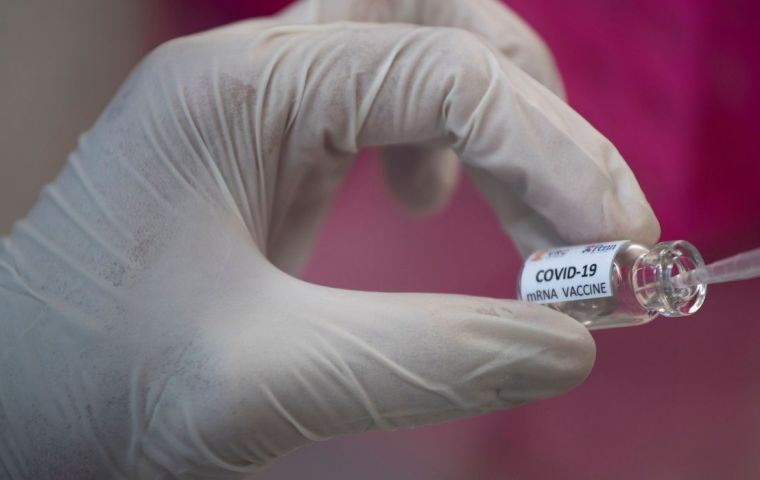MercoPress. South Atlantic News Agency
Brazilian-developed COVID-19 vax to begin human testing
 If approved in the first two phases, the immunization will then go through phase 3 of tests that should involve around 4,000 volunteers
If approved in the first two phases, the immunization will then go through phase 3 of tests that should involve around 4,000 volunteers A drug against Covid-19 developed at the Federal University of Minas Gerais (UFMG) and the Oswaldo Cruz Foundation (Fiocruz) will begin testing with a group of 432 volunteers, it was announced Monday.
Clinical trials of the SpiN-TEC vaccine have been green-lighted by Brazil's National Health Surveillance Agency (Anvisa) for the product created at the joint CT Vaccines facilities.
According to Fiocruz, the clinical trials will start as soon as the National Research Ethics Commission (Conep) revalidates the approval granted previously, which is necessary to contemplate the recommendations presented in Anvisa's opinion.
Testing the vaccine in humans includes three phases before developers apply for the registration of results before regulatory agencies: In phase 1, the safety of the vaccine in a small group of volunteers is evaluated. In Phase 2, researchers increase the number of volunteers and also test the immune response of the proposed vaccine. Finally, in Phase 3, the number of volunteers is further increased, to test the vaccine's effectiveness against a control group.
In the case of the SpiN-TEC trials, the researchers will conduct phase 1 in 72 volunteers, to verify possible side effects, such as headache, local pain, fever, nausea, and others. The volunteers will be observed for one year, but phase 2 can begin if there are no problems within four to six months after the start of phase 1.
In phase 2, the study will have 360 volunteers. In addition to safety, the researchers will observe in this phase the level of antibodies generated and the response of lymphocytes, structures that together can ensure the body's protection against the SARS-CoV-2 virus.
According to Fiocruz, in both stages, the volunteers will be divided into two groups: one with participants aged between 18 and 54, which will undergo the tests first; and the other, with people aged between 55 and 85. The scientists want to understand if the age range can interfere with the immune response and also the vaccine's safety.
The clinical batch of vaccines that will be applied to 432 volunteers during phases 1 and 2 is already available. According to Project Coordinator Ricardo Gazzinelli, after the development of the production process of the active pharmaceutical ingredient (API) at CT-Vaccines (Fiocruz/UFMG), the input was transferred to the University of Nebraska, in the United States, where the batch was manufactured. The packaging, in turn, was performed at the Cristália Pharmaceutical Industrial Complex, in São Paulo.
In addition to proving effectiveness, SpiN-TEC will need to match or surpass that of vaccines already existing on the market to be approved, since most of the population is already immunized and the vaccine will be used as a booster dose.
If approved in the first two phases, the immunization will then go through phase 3 of tests that should involve around 4,000 volunteers, and the production of the vaccines that will be used will rely on a partnership that has already been signed with the Ezequiel Dias Foundation (Funed), central laboratory of the state of Minas Gerais, to manufacture the API.
Packaging should be entrusted to a Brazilian private company that has already expressed interest in marketing SpiN-TEC in case of confirmation of its safety and efficacy, according to Fiocruz.
Laboratory tests performed so far show that the vaccine confers protection against the worsening of Covid-19 cases without causing relevant side effects in mice and non-human primates.
The SpiN-TEC vaccine has different technology than the four covid-19 vaccines used so far in Brazil: CoronaVac, AstraZeneca/Fiocruz, Pfizer, and Janssen. It uses a fusion of two SARS-CoV-2 proteins, S and N, to form a “chimera” protein.
According to the developers, this association gives SpiN-TEC a differential from other immunizers, which target only the S protein, because it is the one the virus uses to invade human cells.
The problem with targeting only the S protein is that it is also the one that has the most accumulated mutations throughout the evolution of the new coronavirus, which gave the new variants more efficiency against neutralizing antibodies. The N protein, on the other hand, is less subject to mutations.
In addition to vaccine safety, the human study wants to prove that by containing the chimera with both proteins, SpiN-TEC will be able to offer protection against coronavirus and its variants without giving them a better chance to escape.
(Source: Agencia Brasil)




Top Comments
Disclaimer & comment rulesCommenting for this story is now closed.
If you have a Facebook account, become a fan and comment on our Facebook Page!